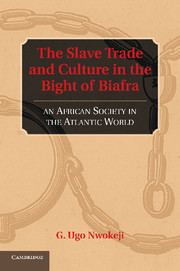Book contents
- Frontmatter
- Contents
- List of Tables and Figures
- Map of the Bight of Biafra and Its Hinterland
- Preface
- Foreword by Paul E. Lovejoy
- 1 Introduction
- 2 The Aro in the Atlantic Context: Expansion and Shifts, 1600s–1807
- 3 The Trade Diaspora in Regional Context: Aro Commercial Organization in the Era of Expansion, 1740–1850
- 4 Culture Formation in the Trading Frontier, c. 1740 to c. 1850
- 5 Household and Market Persons: Deportees and Society, c. 1740–c. 1850
- 6 The Slave Trade, Gender, and Culture
- 7 Cultural and Economic Aftershocks
- 8 Summary and Conclusions
- Notes on Sources
- Sources Cited
- Index
3 - The Trade Diaspora in Regional Context: Aro Commercial Organization in the Era of Expansion, 1740–1850
Published online by Cambridge University Press: 06 December 2010
- Frontmatter
- Contents
- List of Tables and Figures
- Map of the Bight of Biafra and Its Hinterland
- Preface
- Foreword by Paul E. Lovejoy
- 1 Introduction
- 2 The Aro in the Atlantic Context: Expansion and Shifts, 1600s–1807
- 3 The Trade Diaspora in Regional Context: Aro Commercial Organization in the Era of Expansion, 1740–1850
- 4 Culture Formation in the Trading Frontier, c. 1740 to c. 1850
- 5 Household and Market Persons: Deportees and Society, c. 1740–c. 1850
- 6 The Slave Trade, Gender, and Culture
- 7 Cultural and Economic Aftershocks
- 8 Summary and Conclusions
- Notes on Sources
- Sources Cited
- Index
Summary
The Aro trading complex had not only an Atlantic context but also a regional political and economic one. The Aro created what K. Onwuka Dike termed a regional “pax” under which large-scale trade flourished in a multiethnic region, and their operations eased exchange and “brought rapid impetus to economic expansion” in a region with a multitiered currency system. Some further argue that the Aro brought stability to the region. It bears noting, however, that the Aro were only one of several groups in the seventeenth century that resulted from migrations into the Bight of Biafra to partake in the slave trade. Both Arochukwu and the Niger riverine states underwent a period of growth and consolidation throughout the seventeenth century and after. Yet, it was the Aro, rather than these states or any other groups, who came to dominate the hinterland trade. Did the Aro weave their trading network using an organization similar to the organizations of other communities in the region or did they fashion a truly unique model?
That the Aro used an organization based on a fundamentally different model seems to have been the case. While Abo and Igala established a few trading outposts, they did not open up new markets for captives per se. These settlements only dotted the banks of the lower Niger. The most spectacular development of the eighteenth century was the establishment of Aro settlements virtually everywhere in the region.
- Type
- Chapter
- Information
- The Slave Trade and Culture in the Bight of BiafraAn African Society in the Atlantic World, pp. 53 - 81Publisher: Cambridge University PressPrint publication year: 2010



